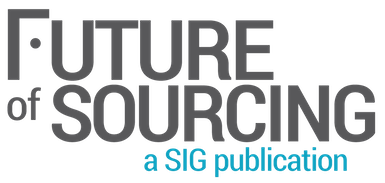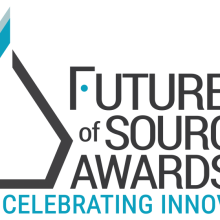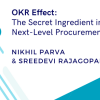1) Can you outline why your team embarked on this project and the problem that needed to be solved?
At BGIS, our diversity and inclusion (D&I) beliefs and practices play a pivotal role in our success as a service-based organization; enabling us to attract and retain the best talent and better reflect the employees, communities, and customers we serve and value. We take pride in our global supplier network, a cornerstone of our success.
The BGIS senior executive team is firmly committed to SDI advancement as an important contributor to our corporate mission of being inclusive in our supply chain practices and our existing and new clients also share a strong SDI commitment. Launching our SDI program moved us beyond quality, cost-effectiveness and reliability and reinforced our Living Sustainability corporate value.
Our mission was to revise selection criteria, support diverse suppliers, foster supply chain inclusivity, and track our progress to ensure continuous improvement. The BGIS SDI initiative aims to provide equal opportunities for organizations from historically underutilized equity-seeking groups, fostering economic inclusion and growth, social equity, and economically beneficial partnerships. Their unique perspectives, expertise and innovations enable us to deliver advanced offerings to our clients. Our goal is a diverse supply chain that fuels innovation, boosts competitiveness and promotes equity, aligning with our corporate social responsibility commitment and our stakeholders' high standards.
These sustainable economic partnerships are advancing through inclusive supply chain practices, authentic community engagement, and transparent business practices. Additionally, at BGIS, working with the Indigenous community is not viewed as means to an end, but rather as an opportunity to establish a new path forward, a path to Reconciliation.
2) How were things done originally and what was the inspiration to innovate the process?
SDI initiatives in Canada began in the early 2000s. It’s a relatively new practice, but it is one that has gained momentum very quickly.
A first big step was joining the Canadian Aboriginal and Minority Supplier Council (CAMSC) as a corporate member in 2011. We then focused on acquiring knowledge and better understanding SDI matters and, in 2015, BGIS Strategic Sourcing initiated Phase 1 of our current SDI strategy, publishing our Sustainable Procurement policy and action plan to provide diverse suppliers greater access to opportunities. Our progressive SDI initiatives have led to significant growth in our diverse supplier base and spend, with an increase of 5,706% (close to 6 thousand %) from 2016 to 2022 and it continues to grow.
Our clients also started their SDI journeys around this time, and we moved forward together. Diversity, integral to our philosophy, is now embedded in our project charter, templates, documents and audit procedures, positioning SDI as the foundation for all we do.
We are particularly proud of our strong Indigenous community partnerships, an initiative highly valued by our clients, and our deepening connections with other diverse communities. Support from the BGIS Leadership team, our Clients, shareholders, employees, and service providers has made SDI a cornerstone of our programs, policies, and contracts.
3) What KPIs did you use to measure success for this project? (For example: performance, customer satisfaction, revenue, sales or relevant financial gains?)
We gauge our outcomes through both quantitative and qualitative measures.
On the quantitative front, we’ve seen consistent annual growth in our SDI spend and our diverse supplier count – close to 6 thousand percent in the first 6 year!. Additionally, the number of clients requiring SDI spend reports has steadily increased. We have integrated SDI as a key metric in our Client Business Reviews, making it a fundamental aspect of all our projects and policies. A number of our Clients also have SDI related spend targets that are part of our service delivery agreements.
On the qualitative side, our Client Account leaders have shown increased engagement in promoting SDI within their respective client organizations. SDI targets are now part of the Account Leaders’ performance objectives, and they are encouraged to participate in SDI council networking events. We have updated our RFx documents and evaluation criteria to include SDI questions and we ensure diverse suppliers are included in calls for quotes/proposals wherever possible.
From a strategic perspective, the BGIS SDI program is now a standard part of the value proposition of Strategic Sourcing and BGIS in new client engagements. It is integrated into business development strategy and proposals presented to potential clients. It has helped the organization win several large client accounts and thus earned BGIS a valuable role as a strategic contributor to the success of those organizations.
Furthermore, we measure our outreach and engagement success with diverse suppliers to optimize relationships. We have also been promoting awareness of our SDI commitments with our existing diverse suppliers who might not be certified, successfully encouraging them to obtain certification.
4) How do you plan to ensure that the new model remains relevant and adapts to the future needs of the market?
Diversity & Inclusion is a global priority for BGIS. The executive team is firmly committed to SDI advancement as an important contributor to our corporate mission of being inclusive in our supply chain practices. SDI is embedded in our project charter, templates, documents and audit procedures, positioning SDI as the foundation for all we do on an ongoing basis. Our existing and new clients also share a strong SDI commitment.
We ensure that we safeguard our SDI program's relevance and importance by ensuring that our policy is current, and that we provide regular progress monitoring, training, and tech innovation. The ongoing support from key stakeholders, including Executive Leadership, Strategic Sourcing and our clients, also ensures that our SDI remains relevant.
Key strategies include:
- Developing clear SDI policies that are regularly reviewed and updated
- Establishing a Global Indigenous Engagement Steering Committee
- Regular evaluation of our SDI program's effectiveness through quantitative progress reports
- Employee training on SDI importance and tools that are available for engaging with diverse suppliers
- Support for the diverse supplier network, including mentoring and training
- Use of technology to streamline SDI reporting processes and to identify potential diverse suppliers
- Transparency about SDI goals and progress
- Partnerships with SDI-focused organizations
We actively engage with diverse supplier communities and related organizations. Notably, our Strategic Sourcing leaders hold key elected positions in CAMSC and NMSDC. We participate in committees, develop supplier handbooks, host best practice events with organizations like WBE Canada and CAMSC, and provide opportunities for Indigenous-owned businesses where they can showcase their services to BGIS buyers.
Most recently, BGIS has made a commitment to become PAR Certified with the Canadian Council for Aboriginal Business (CCAB). The BGIS’ PAR action plan is divided into the four PAR drivers; Leadership Actions, Employment, Business Development, and Community Relations.
These strategies, coupled with our corporate passion, ensure our SDI program's sustainability, contributing to our company's success and the broader goal of economic inclusion and social equity.
As our SDI program evolves, we are developing new approaches to streamline diverse supplier identification, SDI spend reporting and other data-driven activities, freeing SDI leads to focus on strategic activities.
Initiatives include:
- Partnering with our third-party supplier compliance provider to enhance diverse supplier tracking and seamlessly integrate it with our binding self-certification process.
- Working with our IT team to build more efficient Power BI reporting dashboards that provide a direct, real-time link between our spend reports and our diverse supplier database.
- Engaging third-party supplier diversity data services to help with SDI assessment, Tier 1 reporting and to launch a Tier 2 SDI program and Tier 2 reporting, providing further value to our clients.
- Making it easier for diverse suppliers to do business with us.
5) What advice do you have for those who may want to implement this innovative approach in their own organizations?
The advice I would give an organization that is embarking on an SID Program would be to start with engaging with the Supplier Diversity certification organizations and building a supportive network within their Corporate members and their supplier network. They provide a vast wealth of knowledge, training tools, guidance and resources and help them build the business case for the program that will help obtain Executive support.
Executive support is key and it’s important for the business case to align with the overall business strategy. Once their business case is supported by the executives, the next steps would be to develop a policy that would support the process. Executive support is also key in obtaining buy-in from team members who are reluctant to engage with new and unknown suppliers.
Building a robust SDI program takes time and is an ongoing cycle of building and improving your plan, measuring, and reporting, identifying and implementing new opportunities. Communication, training and providing tools to help team members engage are very important. It is imperative that the benefits of an SDI program are understood and that there are tools that make it easy to find and engage with diverse suppliers.
6) What factors do you think are the most important to consider when innovating in this category?
The most important factor is to build a business case that aligns with the organization’s existing values. If your program aligns with the organization's core values, the leadership team is more likely to support it. A successful SDI program needs to be supported by the leadership team. In addition to that, providing training, communication, and tools that make it easy to find diverse suppliers to engage with. It’s important that an SDI program is seen as a value-add and not as something to comply with.









